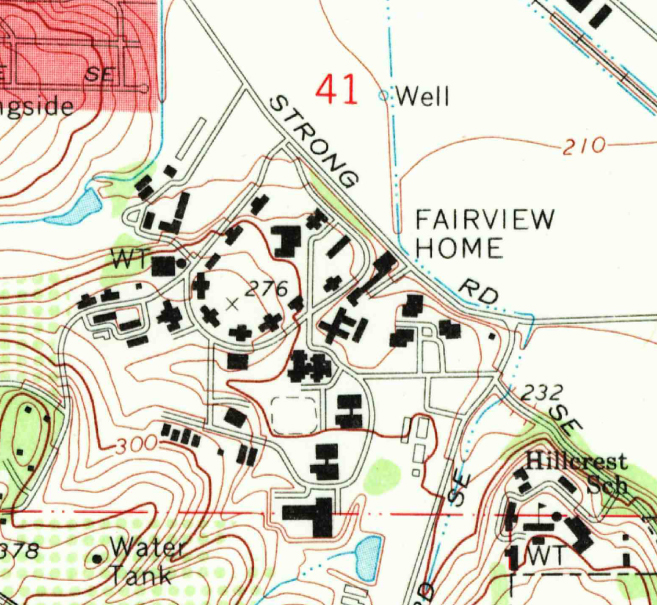"Conditions in the institutions for the mentally ill are less favorable. Both the Oregon State hospital at Salem and the Eastern Oregon State hospital at Pendleton are overcrowded, and the effect of economic cataclysm is evident in the steadily increasing number of commitments since 1930. These institutions supplanted and improved a system under
which before the mentally ill were cared for under contract or by a
private asylum in Portland. Both hospitals provide educational facilities, medical and dental care, and vocational therapy, as does also the Oregon Fairview Home for feeble-minded and epileptics, located near Salem." -Oregon: End of the Trail, 1940, page 97
In Oregon: End of the Trail, the authors provide a chapter titled "Social Welfare" which provides an overview of health issues in Oregon at the time. One especially harrowing section is the description of institutions for the mentally-ill. Conditions at the two state hospitals are described as overcrowded due to increasing numbers of commitments during the "economic cataclysm." The Oregon Fairview Home, originally known as the "Oregon State Institution for the Feeble-Minded", and later called the "Fairview Training Center," was established in 1907 to provide care for persons with developmental disabilities. This included people with epilepsy, even though many were not severely handicapped. This section of the guide also makes reference to the State Board of Eugenics, which "supervised the sterilization of all feeble-minded, insane, epileptics, habitual criminals, moral degenerates, and sexual perverts who are a menace to society." (per Wikipedia). This included many residents of Fairview. In 2002, Oregon Governor John Kitzhaber, M.D., formally apologized for the state's forced sterilization program.
Fairview Home consisted of nine "cottages" arranged in a "U-shaped" pattern, plus additional outbuildings and other structures on a nearly 700-acre campus. The cottages, many named after former Oregon governors, provided housing for patients and staff. Patients were "organized" into the living spaces by type of disability. The philosophy behind building the center was that patients would be trained to cultivate the food needed to support the facility and would live in segregation from the rest of society.
Due to declining finances, changing social views about mental health care, and a lawsuit filed by mental health advocates, Fairview was closed in 2000. In 2002 the property was purchased by a private group for the purpose of building a planned community, now known as the Pringle Creek Community. Meanwhile, the old, decrepit Fairview structures sit vacant, fenced off with many signs warning trespassers of the consequences of entering the property. In 2010, a suspicious fire gutted the Walter Pearce Cottage. Still visible, from the Pringle Community "streets" are several cottages, a 110-foot water tower and a tall smoke stack.
For further reading, the City of Salem maintains a document describing the facility (see here).
Visitors: I urge that if you visit the site, park near the coordinates listed for this waymark and simply take pictures looking up the hill. Climbing the hill and violating the no trespassing orders posted could result in your arrest. If you wish to see more, here's a link to a pretty great set of photos and information from a previous visitor.

Excerpt from USGS 7.5' series "Salem West, Oregon" quadrangle, 1969



(Click a photo to enlarge)
Top Left: Smoke Stack & Water Tower, Top Right: Withycombe Cottage, Bottom: Chamberlain Cottage.